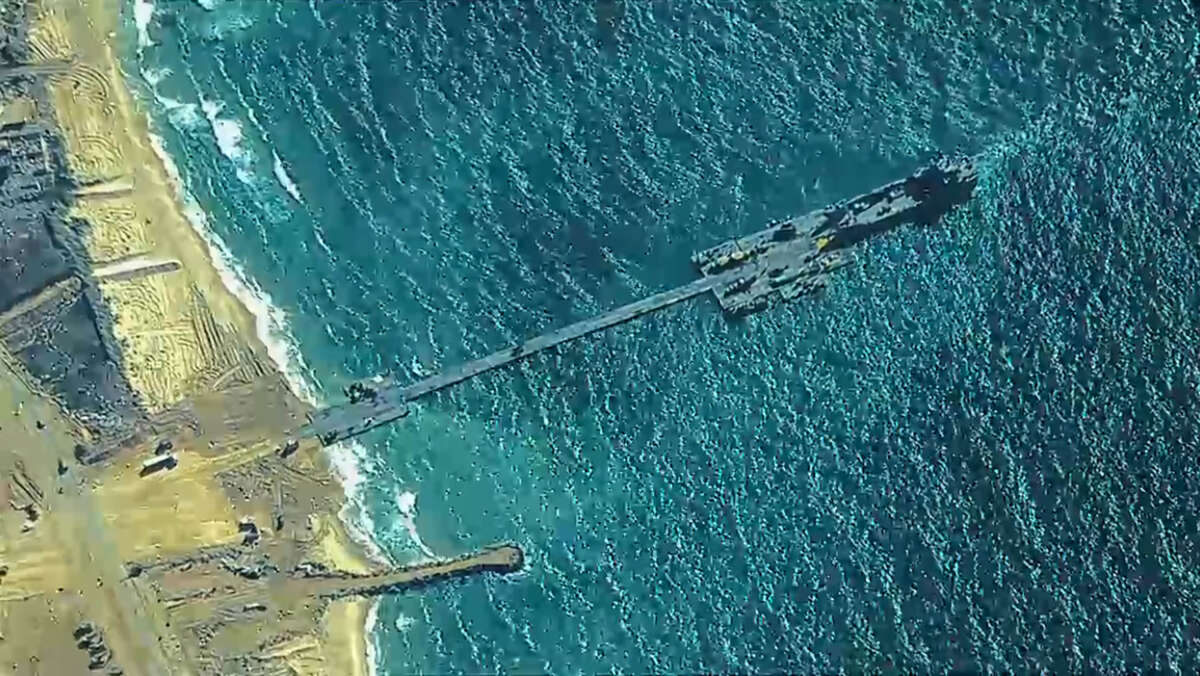The Biden administration swept aside objections about the harmful effects its military pier in Gaza would have on aid delivery efforts in the project’s planning stages, a damning new report from a government watchdog finds.
According to a report published Tuesday by the agency watchdog for the U.S. Agency for International Development (USAID), administration staff and the World Food Programme (WFP) raised a number of concerns about the pier, known as JLOTS — but were often overruled after U.S. officials consulted with Israeli forces.
This includes concerns raised by multiple USAID staff who said “the focus on using JLOTS would detract from the Agency’s advocacy to open land crossings in Israel and Egypt, which were seen as more efficient and proven avenues for delivering aid to Gaza.”
The pier was announced during Biden’s State of the Union speech in March and permanently disconnected months earlier than planned in July, due to weather issues that the report says were repeatedly raised in the planning process.
The report lends evidence to observations by many pro-Palestine advocates and experts that the pier merely served as a cynical PR ploy by a U.S. administration that is totally uninterested in alleviating the humanitarian disaster created by Israel.
This is evidenced by other findings from the report. Crucially, officials did not fulfill requirements for WFP, which was tasked with distributing the aid delivered via the pier, that the group said it needed to participate — suggesting that aid group participation in the aid pier wasn’t a top priority for officials.
In planning discussions, WFP said that the pier needed to be located in northern Gaza; the group needed safety guarantees, fearing for the safety of their workers; and that agencies in charge would be “transitioning the response to civilian operation after the initial 90 days of planned use.”
These conditions were not met. After consulting with the Israeli military and USAID, the U.S. Department of Defense decided instead to moor the pier in central Gaza, right at the end of Israel’s Netzarim Corridor. This is despite the fact that northern Gaza was experiencing the highest amount of food insecurity in the region and, by May, was in “full-blown famine,” WFP said.
Further, rather than security by a third-party group as WFP requested, officials decided that Israeli forces would provide “security” — despite the fact that Israel has an extremely hostile relationship with humanitarian aid workers and has killed hundreds of them amid its genocide.
These decisions would prove to be major contributors to the pier’s failure to provide aid. Ultimately, the pier was attached for roughly 20 of the 90 days expected, and delivered less than a third of the aid that the U.S. had promised — pallets of food that had sat on the beach in the sun for weeks.
Shortly after the pier was first erected, WFP announced it was pausing use of the pier because of safety concerns, citing Israeli shelling of WFP’s warehouses. This announcement came a day after Israel’s raid of Nuseirat refugee camp that killed 274 people, which Israeli forces staged using an area near the pier, according to photos and video.
This pause, according to the report, also came after crowds of hungry Palestinians had “improperly removed” aid from a dozen WFP trucks attempting to transport aid from the pier to their warehouse — after which Israel temporarily barred WFP from making deliveries and dragged their feet on approving more secure routes for WFP trucks to take.
Meanwhile, a USAID staffer said the relative safety of the aid routes was extremely volatile as “planned distribution routes could become evacuation zones within a matter of hours.”
Angry, shocked, overwhelmed? Take action: Support independent media.
We’ve borne witness to a chaotic first few months in Trump’s presidency.
Over the last months, each executive order has delivered shock and bewilderment — a core part of a strategy to make the right-wing turn feel inevitable and overwhelming. But, as organizer Sandra Avalos implored us to remember in Truthout last November, “Together, we are more powerful than Trump.”
Indeed, the Trump administration is pushing through executive orders, but — as we’ve reported at Truthout — many are in legal limbo and face court challenges from unions and civil rights groups. Efforts to quash anti-racist teaching and DEI programs are stalled by education faculty, staff, and students refusing to comply. And communities across the country are coming together to raise the alarm on ICE raids, inform neighbors of their civil rights, and protect each other in moving shows of solidarity.
It will be a long fight ahead. And as nonprofit movement media, Truthout plans to be there documenting and uplifting resistance.
As we undertake this life-sustaining work, we appeal for your support. Please, if you find value in what we do, join our community of sustainers by making a monthly or one-time gift.
